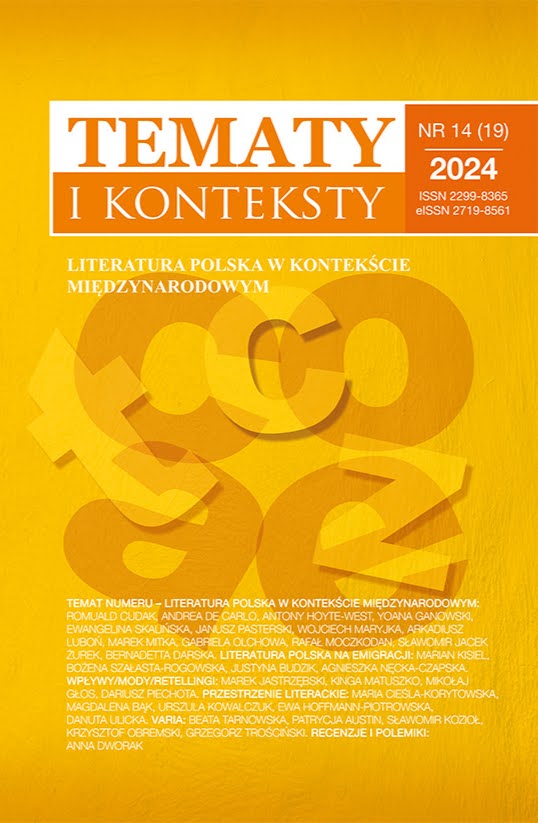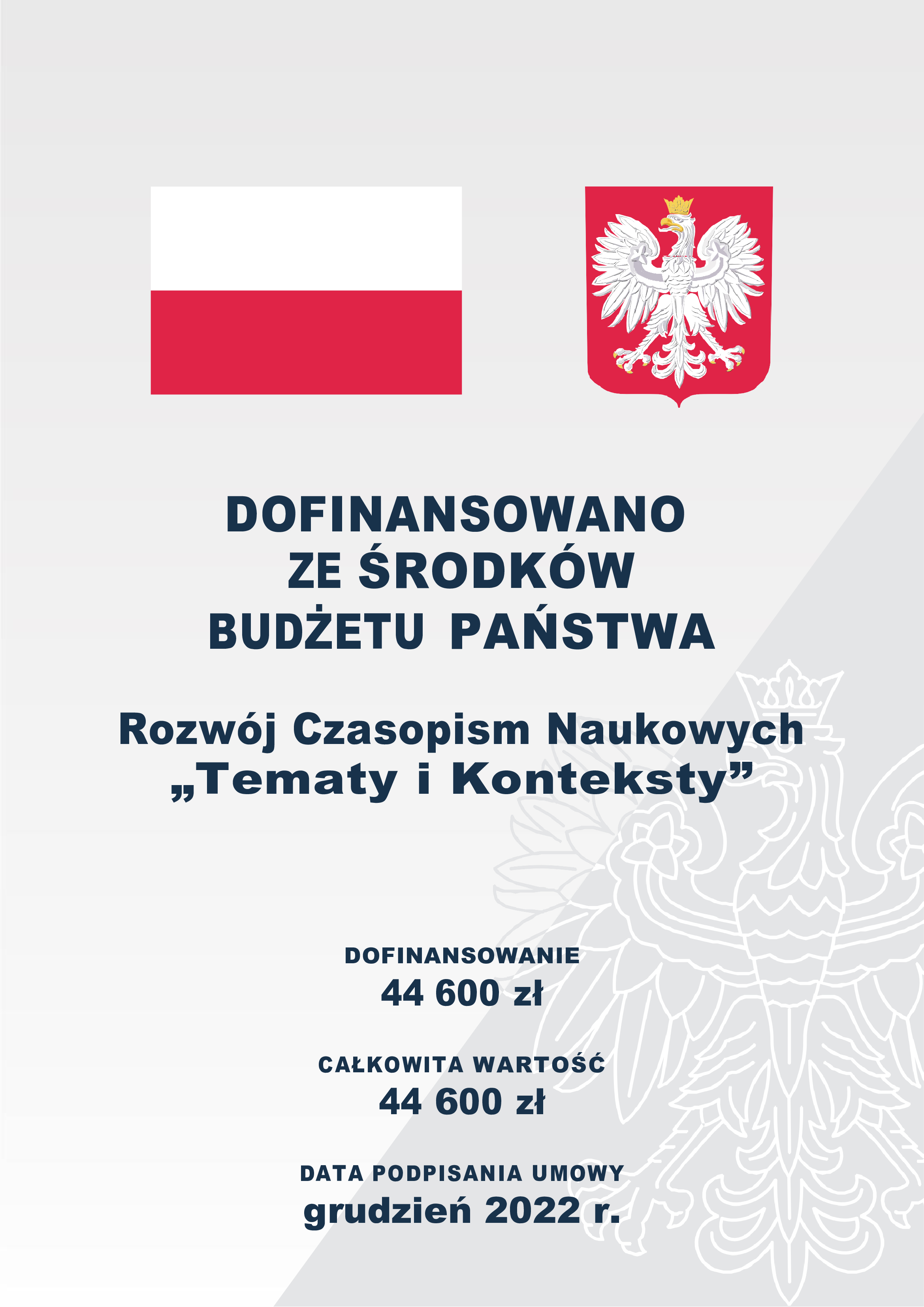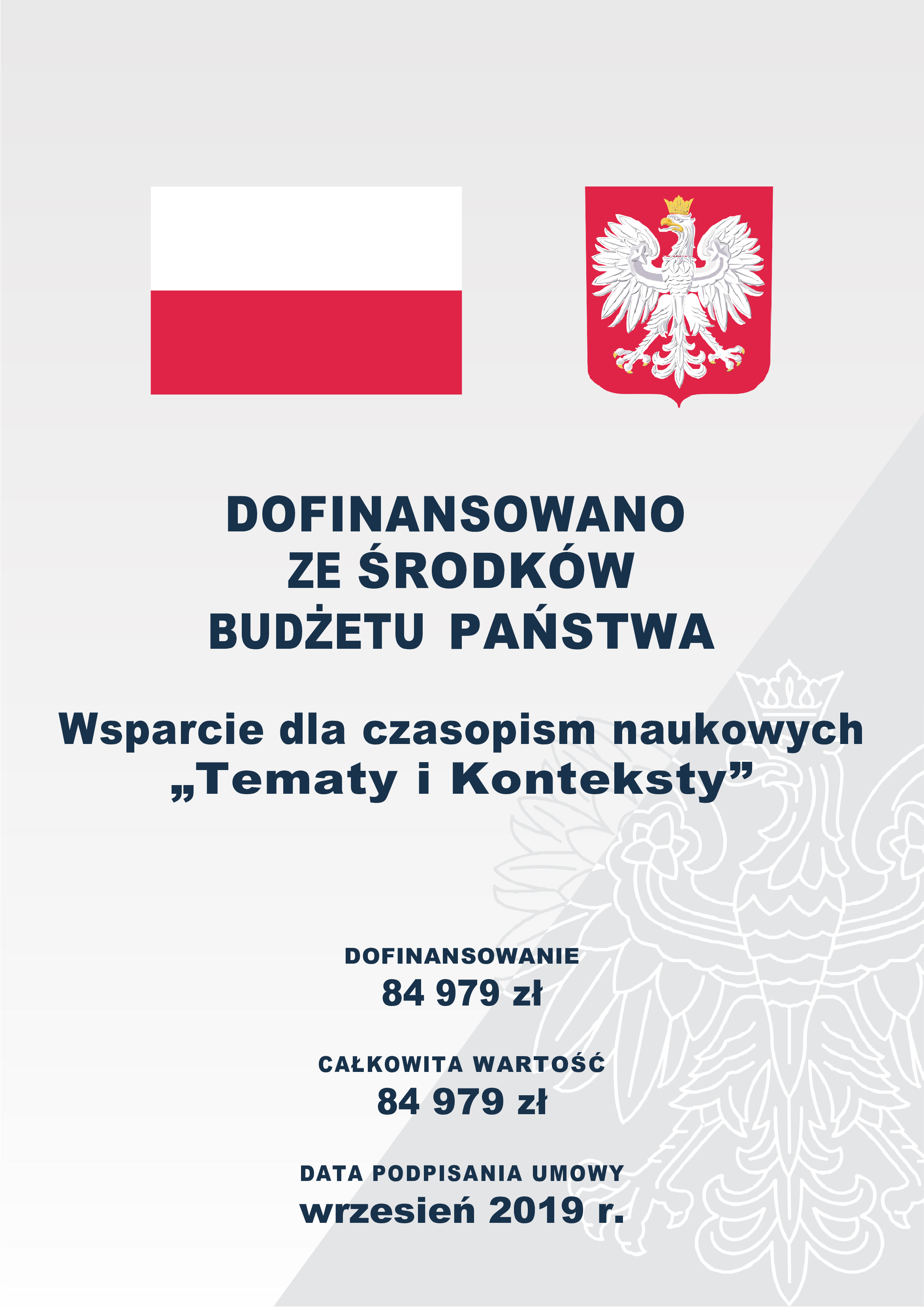Rebeless. Inanna as the heroine of Polish retellings of Sumerian myths
DOI:
https://doi.org/10.15584/tik.2024.20Keywords:
retelling, sumerian mythology, myth, Inanna, feminismAbstract
The aim of the article is to interpret two Polish retellings of the myths about the Sumerian goddess Inanna – Inanna (1986) by Julita Mikulska and Anna In w grobowcach świata (2006) by Olga Tokarczuk. Both novels have in common the need to modernize these stories, placing them in a futuristic – or even post-apocalyptic – dimension of reality. Each of them is an attempt to comment on contemporary times, where the role of a woman, although emancipated and established, is subject to the constant pressure of patriarchy. The myth of the Sumerian goddess used by the writers serves two different purposes. In Mikulska's prose it is a woman's fight for her autonomy, while in Tokarczuk’s work Inanna becomes a messiahess who sacrifices herself for a better world in which there will be a place for everyone, previously excluded and humiliated.
Downloads
References
Amenta A., Wokół reinterpretacji sumeryjskiego mitu o bogini Inannie w „Annie In w grobowcach świata” Olgi Tokarczuk, tłum. A. Cypko [w:] Boginie, bohaterki, syreny i pajęczyce. Polskie pisarki współczesne wobec mitów, red. tenże i K. Jaworska, Warszawa 2020.
Araszkiewicz A., Czarny ląd czarnego kontynentu. Relacja matka-córka w ujęciu Luce Irigaray [w:] Ciało, płeć, literatura. Prace ofiarowane Profesorowi Germanowi Ritzowi w pięćdziesiątą rocznicę urodzin, red. M. Hornung, M. Jędrzejczak i T. Korsak, Warszawa 2001.
Beauvoir de S., Druga płeć, tłum. G. Mycielska, M. Leśniewska, Warszawa 2014.
Bielicki M., Zapomniany świat Sumerów, Warszawa 1966.
Black J., Green A., Gods, Demons and Symbols of Ancient Mezopotamia. An Illustrated Dictionary, Londyn 1992.
Całek A., Retelling w literaturze fantasy: od renarracji do metafikcji [w:] Tekstowe światy fantastyki, red. M. Leś, W. Łaszkiewicz i P. Stasiewicz, Białystok 2017.
Cambell J., Potęga mitu, tłum. I. Kania, Kraków 1994.
Carlo de A. F., Arachne, Atena i ich córki. Strategia pajęczycy we współczesnej polskiej literaturze kobiecej [w:] Boginie, bohaterki, syreny i pajęczyce. Polskie pisarki współczesne wobec mitów, red. K. Jaworska i A. Amenta, Warszawa 2020.
Connell R., Masculinities, Berkeley-Los Angeles 2005.
Dul-Kuźniar M., „Anna In w grobowcach świata” – Olgi Tokarczuk „przepisywanie” mitu [w:] Światy Olgi Tokarczuk, red. M. Rabizo-Birek, M. Pocałuń-Dydycz i A. Bienias, Rzeszów 2013.
Frymer-Kensky T., In the Wake of the Goddesses: Women, Culture and the Biblical Transformation of Pagan Myth, Nowy Jork 1992.
Głos M., Kto uratuję Ariadnę? Palingeneza kreteńskiego mitu w popfeministycznych retellingach (na przykładzie „Pani Labiryntu” Magdy Knedler i „Ariadny” Jennifer Saint) „Zagadnienia Rodzajów Literackich” 2023, nr 1.
Grimal P., Słownik mitologii greckiej i rzymskiej, tłum. J. Łanowski, Wrocław 2008.
Harris R., Inanna-Isthar as Paradox and a Coincidence of Opposites, „History of Religion” 1991, nr 3. DOI: https://doi.org/10.1086/463228
Irigaray L., Éthique de la différance sexuelle, Paryż 1984.
Lasoń-Kochańska G., Kobiety opowiadają świat. Szkice o fantastyce, Słupsk 2008.
Laughing with Medusa: Classical Myth and Feminist Thought, red. V. Zajko, M. Leonard, Oxford 2006.
Leick G., A Dictionary of Ancient Near Eastern Mythology, Nowy Jork-Londyn 2003. DOI: https://doi.org/10.4324/9780203028520
Matuszko K., W poszukiwaniu Pięknego Ludu – palingeneza niektórych motywów folkloru celtyckiego w wybranych powieściach young adult fantasy, „Dzieciństwo. Literatura i Kultura” 2023, nr 5 (2). DOI: https://doi.org/10.32798/dlk.1202
Mikulska J., Inanna, Warszawa 1986.
Nomis A. O., The History and Arts of Dominatrix, Londyn 2013.
Pryke L. M., Isthar, Sydney 2017. DOI: https://doi.org/10.4324/9781315716329
Siwor D., Tropy mitu i rytuału. O polskiej prozie współczesnej – nie tylko najnowszej, Kraków 2019.
Szarzyńska K., Mity sumeryjskie, Warszawa 2000.
Szczuka K., Kopciuszek, Frankenstein i inne. Feminizm wobec mitu, Kraków 2001.
Tokarczuk O., ahat ilī. Siostra bogów, posłowie, komentarze, wybór ilustracji Z. Mikołejko, Gdańsk 2024.
Tokarczuk O., Anna In w grobowcach świata, Kraków 2006.
Urbaniak-Piotrowska M., „Puszczalska” albo „szmata”. Na czym polega slut-shaming i dlaczego to może być dobry znak, że cię spotyka?, „Zwierciadło” 2023, https://zwierciadlo.pl/seks/532960,1,puszczalska-albo-szmata-na-czym-polega-slut-shaming-i-dlaczegoto-moze-byc-dobry-znak-ze-cie-spotyka.read [dostęp 03.02.2024].
Verderame L., La vestizione de Inanna [w:] Abiti, corpi, identiá. Significati e valenze profonde del vestire, red. S. Botta, Firenze 2009.
Wolkstein D., Kramer S. N., Inanna: Queen od Heaven and Earth: Her Stories and Hymns from Sumer, Nowy Jork 1983.
Downloads
Published
How to Cite
Issue
Section
Categories
License
Copyright (c) 2024 Tematy i Konteksty

This work is licensed under a Creative Commons Attribution-NonCommercial-NoDerivatives 4.0 International License.




